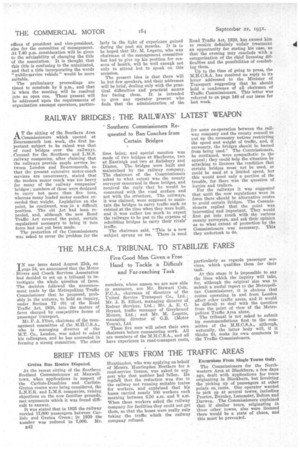RAILWAY BRIDGES: THE RAILWAYS' LATEST WEAPON
Page 60

If you've noticed an error in this article please click here to report it so we can fix it.
Southern Commissioners Requested to Ban Coaches from Certain Bridges AT the sitting of the Southern Area Commissioners which opened at Bournemouth last week, the first important subject to be raised was that of road bridges over the railways. Counsel for the Southern and L.M.S. railway companies, after claiming that the railways provide ample service between London and Bournemouth, so that the present extensive motor-coach services are unnecessary, stated that the modern motor coach was too heavy for many of the railway companies' bridges ; numbers of these were designed to carry not more than five tons, whereas many loaded motor coaches exceeded that weight. Legislation on the point, he continued, was in a difficult position. The old Act had been repealed, and, although the new Road Traffic Act covered the point, certain regulations necessary to bring it into force had not yet been made.
The protection of the Commissioners was asked to cover the problem for the time being, and special mention was made of two bridges at Sherborne, two at Eastleigh and two at Salisbury and Dinton. The bridges were built and maintained by the railway company. The chairman of the Commissioners asked to what extent was the county surveyor concerned in these bridges, and received the reply that he would be concerned with the road surface and not with the structure. The railways, it was claimed, were supposed to maintain the bridges to carry traffic such as existed at the time when they were built, and it was rather too much to expect the railways to be put to the expense of rebuilding bridges to carry their rivals' traffic. .
The chairman said, "This is a new subject sprung on me. There is need
for some co-operation between the railway company and the county council to put up the necessary notices restricting the speed and weight of traffic, and, if necessary, the bridges should be barred from being used." The Commissioners, he continued, were sympathetic to the appeal ; they could help the situation by attaching to licences the condition that certain bridges must not be used, or could be used at a limited speed, but this would meet only a portion of the trouble, for there was the question of lorries and trailers.
For the railways it was suggested that until the new regulations were in force there should be alternative routes to avoid certain bridges. The Commissioners replied that the point was interesting and important. They would first get into touch with the various county surveyors, and ask their opinion as to what extent of protection by the Commissioners was necessary. This they undertook to do.




































































































